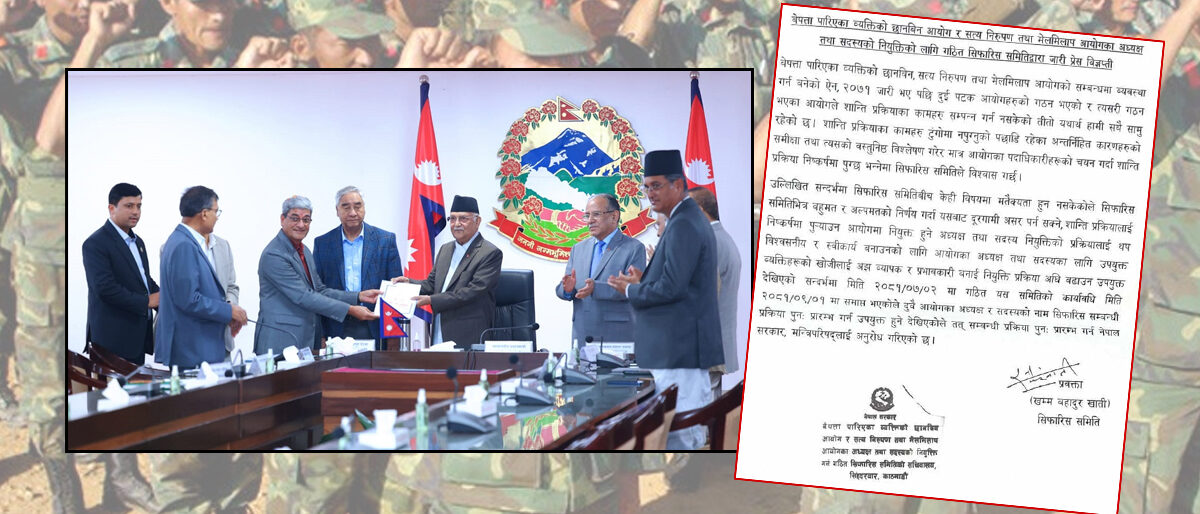KATHMANDU: The two major ruling parties, the Nepali Congress and the CPN-UML, along with the main opposition Maoist Centre, were initially enthusiastic after the House of Representatives passed the Truth and Reconciliation Commission (TRC) and the Commission for the Investigation of Disappeared Persons (CIDP) Certification Bill.
The TRC Bill was unanimously passed by the House on August 22, with the parties hailing it as a significant achievement in the peace process.
This marked a potential conclusion to the peace process, which had begun after the then-rebel Maoist ended its 10-year armed conflict and entered mainstream politics.
After 18 years, it seemed that the peace process was finally reaching its conclusion. However, the parties are still at odds over the formation of the commission.
Internal conflicts between the parties have led to the dissolution of the secretariat of the recommendation committee formed to appoint the chairperson and members of the Commission for the Investigation of Disappeared Persons and the Truth and Reconciliation Commission.
Although the TRC Bill, which had been stalled in parliament for a long time due to political disagreements between the ruling Congress-UML alliance and the opposition Maoists, was finally certified by the President’s Office, its implementation has been delayed due to internal political issues.
Despite attempts to recommend office-bearers on Sunday and Monday, the committee was dissolved without completing its mandate due to a lack of consensus among its members.
Spokesperson Khamma Bahadur Khati stated that the committee had failed to recommend names due to disagreements on certain issues.
He emphasized that a decision made by majority vote could have significant long-term consequences.
In a statement issued on Monday, Khati explained that the committee’s dissolution was intended to ensure the appointment process was credible and acceptable, ultimately bringing the peace process to a close.
Khati also noted that it seemed more appropriate to expand and refine the search for suitable candidates for the chairperson and members of the commission to ensure a more effective and thorough appointment process.
However, the ruling party, UML, expressed dissatisfaction with the dissolution of the recommendation committee, particularly since it had not completed its work within the 60-day time frame.
UML Chief Whip Mahesh Bartaula criticized the government’s failure to create a cooperative environment for the committee to recommend the chairperson and members of both commissions.
He stated, “It is inappropriate for a committee formed according to the law to be unable to function. It should have worked. What prevented it from doing so is another matter.”
Bartaula further claimed that the government had not obstructed the committee’s ability to work impartially and make recommendations.
Although doubts have emerged due to the committee’s inability to recommend the necessary candidates, Bartaula assured that a new process would move forward quickly.
“The responsibility of editing should have been borne by those who took responsibility. If that was not done, it raises concerns about what will happen next,” he added. “Now, we will also move forward quickly.”
Was the dissolution of the recommendation committee a result of internal political conflicts?
Bartaula explained that the positions of chairperson or member of the commission were not merely about obtaining a job.
“The goal is to conclude the peace process, resolve the issues of the transitional conflict, deliver justice to the victims, and hold the perpetrators accountable,” he said. “Therefore, this matter is fundamentally distinct from other political issues.”
Bartaula reassured that the parties would continue to advance the peace process through legal means.
“The committee should have worked and made its recommendations, but it did not. The government will now consider how to proceed in a new direction. There are legal pathways to follow, and we will utilize them.”
Khati, the spokesperson for the dissolved recommendation committee, stated that the government had been urged to restart the process of recommending names for the chairperson and members of both commissions, deeming it the most appropriate course of action.
The Council of Ministers will now need to form a new recommendation committee to proceed with the formation of the commissions.
The newly formed committee will have to invite new applications and continue the appointment process.
On November 8, the Secretariat of the Mishra-led recommendation committee, tasked with recommending the chairperson and members of the commissions, published a notice inviting applications.
The committee, led by former Chief Justice of the Supreme Court Om Prakash Mishra, was formed on October 18, 2024, with a mandate until December 16.
The Commission has distributed identity cards to 600 conflict victims, and 538 people have been recommended for government compensation.
A total of 158 applicants expressed interest in the positions. Of these, 40 names were shortlisted.
According to the dissolved committee, eight candidates were shortlisted for the two chairperson positions, and 32 were shortlisted for the eight-member positions across both commissions.
After extensive discussions between the major parties, the Commission for the Investigation of Enforced Disappearances and Truth and Reconciliation Act (Third Amendment) Bill, 2081, was unanimously passed by the House of Representatives on August 14.
The amended TRC Bill was later sent to the President for ratification by Speaker Devraj Ghimire on August 28.
President Ram Chandra Poudel certified the Truth and Reconciliation Commission (TRC) and the Commission for the Investigation of Enforced Disappearances (CIDP) Bill on August 15.
He did so in accordance with Article 113, Clause (2) of the Constitution of Nepal.
After the President’s certification and the bill’s publication in the Gazette, it is to be implemented as law.
However, nearly four months later, the process of forming the Commission has not been completed.
The Commission for the Investigation of Enforced Disappearances and Truth and Reconciliation Act of 2071 specifies that the commission will consist of five members, including the chairperson. At least one of these members must be a woman.
To qualify for the position of chairperson or member, applicants must hold at least a master’s degree from a recognized educational institution, not be a member of any political party, possess high moral character, and have worked in the fields of human rights, peace, conflict resolution, or sociology. They must also be at least 35 years old.
For the chairperson, it is specified that they should have been a judge of the Supreme Court, the Chief Justice of the Court of Appeal, have served in a senior position within the Nepal Judicial Service, or have the qualifications to become a Supreme Court judge.
“The main problem is regarding reparations. Compensation should reflect the actual loss and damage caused. For example, there are individuals who still carry bullets in their bodies. How much compensation should be given to them? These are serious issues,” she explained.
Although the TRC Bill, which had been stalled in parliament for a long time due to political disagreements between the ruling Congress-UML alliance and the opposition Maoists, was finally certified by the President’s Office, its implementation has been delayed due to internal political issues.
Work to be completed by the Commission
According to Ganesh Dutta Bhatta, former chairperson of the Truth and Reconciliation Commission, approximately 64,000 complaints were previously received by the commission from across the country.
Of these, 3,700 complaints have been investigated, and the commission has finalized its decisions on these cases.
Bhatta, in information shared with various media outlets, reported that out of the 64,000 complaints, 3,000 are still under review, while 2,200 have been decided.
The Commission has distributed identity cards to 600 conflict victims, and 538 people have been recommended for government compensation.
Similarly, the commission formed to investigate enforced disappearances has registered 3,288 complaints. Of these, 754 have been resolved, while 2,534 remain pending.
Identifying serious human rights violations among the complaints filed with the Truth and Reconciliation Commission, determining appropriate punishment, and initiating reparations for victims remain challenging tasks for the commission.
Senior advocate Leela Udasi, a former member of the Truth and Reconciliation Commission, highlights the difficulty of addressing crimes committed during the conflict.
In a previous interview with Khabarhub, she acknowledged that the challenges faced earlier due to the vagueness and limited application of the law were being somewhat alleviated by recent amendments to the TRC Bill.
Udasi also identifies reparations as another significant challenge for the commission.
“The main problem is regarding reparations. Compensation should reflect the actual loss and damage caused. For example, there are individuals who still carry bullets in their bodies. How much compensation should be given to them? These are serious issues,” she explained.









Comment